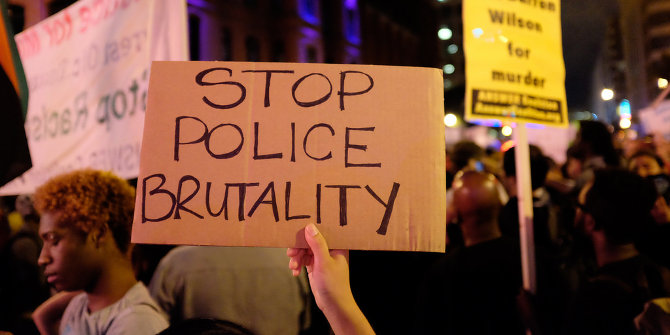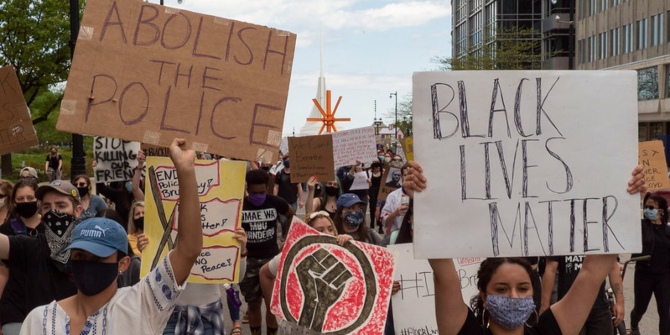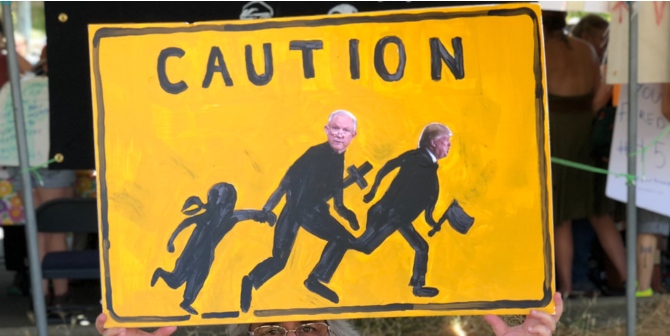 Last year’s protests in response to the shooting by police of Michael Brown in Ferguson, Missouri, has brought the issue of police accountability to the national stage. Lynda G. Dodd writes that while civil constitutional lawsuits have a much greater scope for holding police officers accountable compared to the Department of Justice, such suits are the ‘worst of both worlds’; they are rarely successful, and even when they are, police officers are shielded from paying fees or damages by their employers. She argues that reforms targeting data collection around police misconduct are likely to do the most to strengthen civil litigation as a deterrent.
Last year’s protests in response to the shooting by police of Michael Brown in Ferguson, Missouri, has brought the issue of police accountability to the national stage. Lynda G. Dodd writes that while civil constitutional lawsuits have a much greater scope for holding police officers accountable compared to the Department of Justice, such suits are the ‘worst of both worlds’; they are rarely successful, and even when they are, police officers are shielded from paying fees or damages by their employers. She argues that reforms targeting data collection around police misconduct are likely to do the most to strengthen civil litigation as a deterrent.
Since the Ferguson protests of 2014 moved the issue of accountability for police brutality into the national spotlight, much of the public debate following each new police shooting has focused on the criminal liability of the officers involved and the role of local grand juries in shielding those officers from criminal prosecution. But local criminal prosecutions are not the only legal mechanism for holding police officers and other government officials accountable.
In the past year, protestors and civil rights leaders have also repeatedly called on the Justice Department to pursue federal criminal prosecutions and broader civil rights investigations.
While Eric Holder, the first African American attorney general, revitalized the Department’s Civil Rights Division and the Justice Department does have authority to hold local police officers accountable for constitutional violations, it is important to recognize that the scope of its enforcement activity is miniscule compared to private civil rights litigation to enforce the Constitution. Civil lawsuits for monetary damages under 42 U.S.C. § 1983 offer a more widely available mechanism for holding police officers accountable and have, for this reason, been a central component of the rights revolution since the 1960s.
Why have activists pushed for Justice Department investigations in recent months? Civil rights advocates believe the structural reform packages ordered by the Justice Department have produced more significant reforms than Section 1983 litigation. When the Justice Department does conduct widespread investigations of police departments, it relies on its authority under § 14141 of the Violent Crime Control and Law Enforcement Act of 1994. This provision gives the U.S. attorney general the power to pursue structural reform litigation against police departments found to be engaging in a “pattern or practice “of unconstitutional behavior. The Justice Department has used § 14141 to conduct investigations and enter into federal consent decrees or settlement agreements with police departments across the country, including Cincinnati, Los Angeles, New Orleans, Pittsburgh, Seattle, Detroit, Oakland, Albuquerque, and Washington, D.C. Most Justice Department consent decrees or settlements include reforms requiring improved data collection, early intervention systems, effective citizen complaint investigation procedures, and strengthened internal and external review procedures. Although many of the particulars will vary depending on the size of the department, these goals and reform categories are fairly well established. A leading scholar of policing, Samuel Walker, uses the acronym “PTSR” – policy, training, supervision, and review—when summarizing these features of “the new police accountability” agenda pursued by the Justice Department. Although federal interventions under § 14141 are rare, when they are fully implemented, these reforms have produced impressive results.
While these structural reform packages are impressive, litigation through Section 1983 is the only legal tool that is available to reach the nearly 18,000 police departments nationwide. The federal government typically investigates only a handful of police departments each year. In 2013, private litigants filed over 15,000 cases in federal district courts to enforce civil rights, and prisoners filed well over 30,000 civil rights claims. Section 1983 litigation is by far the most-used vehicle for the enforcement of constitutional rights against police officers and other government officials.
Credit: ep_jhu (Flickr, CC-BY-NC-2.0)
Yet the available evidence suggests that constitutional tort litigation – even when it results in a settlement or judgment in favor of the plaintiff – does not tend to produce effective policy reforms.
One of the core problems with Section 1983 litigation is that police officers being sued rarely face any consequences, even when plaintiffs win settlements or judgements. Although a recent Wall Street Journal cover article found that the cost of police misconduct claims has “soared” in recent years in the nation’s largest cities, an important 2014 study showed that the vast majority of police officers in the U.S. are indemnified by their employers. These indemnification policies shield police officers from paying for their attorney fees or monetary damages.
To strengthen the deterrent effects of Section 1983 suits, some civil rights advocates have argued for limiting these indemnification policies or taking damage awards and settlements from police department budgets rather than general municipal budgets. Right now, however, we appear to have the worst of both worlds. Very few civil rights plaintiffs have a chance to win at trial, and even when they do win settlements, and occasionally very large settlements, cities tend not to accept any responsibility for reform. So, despite the high costs to taxpayers, especially in the largest cities with the most claims of police misconduct, very little is done to deter future violations.
One promising solution to these challenges is to improve the collection of data regarding police misconduct. In New York City, for instance, very little is done to rein in repeat offenders in the NYPD. In 2014, Comptroller Scott Stringer introduced CLAIMSTAT to track lawsuits and increase accountability. While it remains to be seen how CLAIMSTAT reports will actually be used by the NYPD, members of the City Council are proposing new methods of tracking misconduct claims and the NYCLU has called for a public database for all use of force incidents.
Another positive step is the Obama administration’s Police Data Initiative to develop best practices for data collection and dissemination in more cities across the country. Other reforms may have more ambiguous results, such as the Justice Department’s awarding federal funding for body-worn camera programs without requiring that local jurisdictions develop policies to ensure the data collected are subject to public oversight. Much more obviously remains to be done in this area, especially to address the powerful role of police unions and special protections limiting access to policing data. Organized efforts to improve access to policing data, including the very promising Campaign Zero, have called attention to the need for reforms nationwide.
Reforms targeting data collection are likely to do the most to strengthen the deterrent effect of constitutional tort litigation. The lesson of the recent stop-and-frisk litigation (brought under Section 1983) is that these kinds of public records are essential if we are to increase police accountability: sunlight is an excellent disinfectant. Collecting such data and making them available would not only support new lawsuits but also, and even more crucially, open up new possibilities for democratic accountability and reforms to deter future misconduct.
The article is based on the paper, ‘The Rights Revolution in the Age of Obama and Ferguson: Policing, the Rule of Law, and the Elusive Quest for Accountability’, in Perspectives on Politics. The article will be free to access until December 31st , thanks to Cambridge Journals.
Please read our comments policy before commenting.
Note: This article gives the views of the author, and not the position of USAPP – American Politics and Policy, nor the London School of Economics.
Shortened URL for this post: http://bit.ly/1NaVGJF
_________________________________
 Lynda G. Dodd – The City University of New York
Lynda G. Dodd – The City University of New York
Lynda G. Dodd is the Joseph H. Flom Professor of Legal Studies and Political Science at The City University of New York–City College, and is on Twitter at @CivilRightsProf. She is writing a book, Taming the Rights Revolution: The Supreme Court, Constitutional Torts, and the Elusive Quest for Accountability, examining the Supreme Court’s development of the legal framework for Section 1983 litigation.







